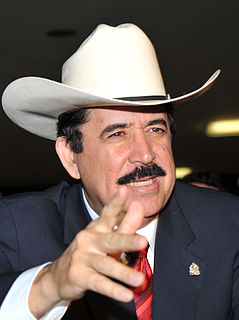Honduras was already occupied by many indigenous peoples when the Spanish arrived in the 16th century. The western-central part of Honduras was inhabited by the Lencas, the central north coast by the Tol, the area east and west of Trujillo by the Pech, the Maya and Sumo. These autonomous groups maintained commercial relationships with each other and with other populations as distant as Panama and Mexico.
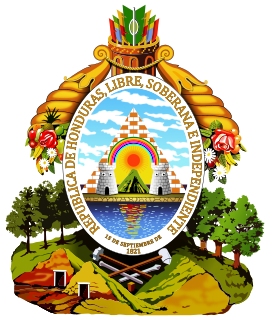
Politics of Honduras takes place in a framework of a multi-party system presidential representative democratic republic. The President of Honduras is both head of state and head of government. Executive power is exercised by the government. Legislative power is vested in the National Congress of Honduras. The party system is dominated by the conservative National Party of Honduras and the Liberal Party of Honduras. The Judiciary is independent of the executive and the legislature.
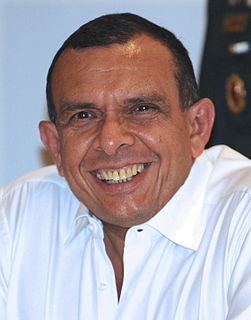
Porfirio Lobo Sosa, known as Pepe Lobo, is a Honduran politician and agricultural landowner who served as President of Honduras from 2010 to 2014. A member of the conservative National Party and a former deputy in the National Congress of Honduras from 1990, he was president of the National Congress of Honduras from 2002 to 2006. He came second to Manuel Zelaya with 46% of the vote in the 2005 general election. After the military ousted Zelaya in a coup d'état, Lobo was elected president in the 2009 presidential election and took office on 27 January 2010.

Honduras National Congress has 128 members (diputados); they serve four-year terms.
Yani Benjamin Rosenthal Hildago is a businessman and politician.
Elvin Ernesto Santos Ordóñez was Vice President of Honduras between 27 January 2006 and 18 November 2008, when he resigned to stand as a Liberal Party candidate for the Presidency in the 2009 elections. For the 2005 election the constitution was amended to create a single vice-president. Although Santos served as Vice President under the presidency of Manuel Zelaya, he distanced himself from Zelaya since there were conflicts between the two politicians. He was also against the fourth ballot box referendum that Zelaya promoted.
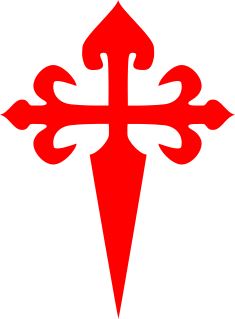
The Conservative Party of Chile was one of the principal Chilean political parties since its foundation in 1836 until 1948, when it broke apart. In 1953 it reformed as the United Conservative Party and in 1966 joined with the Liberal Party to form the National Party. The Conservative Party was a right-wing party, originally created to be the clericalist, pro-Catholic Church group.
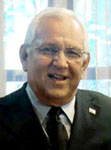
Roberto Micheletti Baín is a Honduran politician who served as the interim de facto president of Honduras from June 28, 2009 to January 27, 2010 as a result of the 2009 Honduran coup d'état. The Honduran military ousted the President, and the National Congress read a letter of resignation, which was refuted two minutes later by Zelaya in conversation with CNN en Español; days later, the coup-plotters claimed that the Supreme Court had ordered to forcefully detain President Manuel Zelaya because "he was violating the Honduran constitution"; Zelaya was exiled rather than arrested. Micheletti, constitutionally next in line for the presidency, was sworn in as president by the National Congress a few hours after Zelaya was sent into exile by the Honduran military. He was not acknowledged as de jure president by any government or international organization. The 2009 General Election took place as planned in November and elected Porfirio Lobo Sosa to succeed Micheletti.
The Honduran general election, 2009 was held in Honduras on November 29, 2009, including presidential, parliamentary and local elections. Voters went to the polls to elect:
The 2009 Honduran constitutional crisis was a political confrontation concerning the events that led to, included, and followed the 2009 Honduran coup d'état and the political breakdown associated with it. The coup was repudiated around the globe, but Roberto Micheletti, head of the government installed after the coup, has claimed that the Honduran Supreme Court ordered the detention of Manuel Zelaya, deposed President of Honduras, and that the following succession was constitutionally valid.

Mario Canahuati is a Honduran politician, businessman and a former Honduran ambassador to the United States. He is a former President of the Honduran Council of Private Enterprise (COHEP).

Liberty and Refoundation is a leftist political party in Honduras. Libre was founded in 2011 by the National Popular Resistance Front (FNRP), a leftist coalition of organizations opposed to the 2009 coup.

General elections were held in Honduras on November 24, 2013. Voters went to the polls to elect a new President, the 128 members of the National Congress, 298 Mayors and vice-mayors and their respective councilors and 20 representatives to the Central American Parliament.
Alexander Erick Martínez Ávila, also known as Erick Martínez, was a Honduran advocate and spokesperson for lesbian, gay, bisexual, and transgender (LGBT) minority rights in Tegucigalpa, Honduras. A former journalist, he went into public relations for Asociación Kukulcán. He was also known to be a "Zelayista" activist. Days after his announcement to run as a Resistencia Party congressional candidate in the November elections, Martínez went missing and was found strangled to death about 3 kilometers from the capital.
List of events in the year 2011 in Honduras.
Margarita Dabdoub Sikaffi is a Honduran politician. She is commonly known as Margie Dip. Dabdoub was the first female mayor of La Ceiba. She served as mayor of La Ceiba 1994–1998. Prior to entering electoral politics, Dabdoub worked as spokesperson for the Standard Fruit Company. She was named as governor of the Atlantida department by president Manuel Zelaya. Following the 2009 Honduran coup d'etat, that ousted Zelaya, Dabdoub declared that she had not been a 'cuartista' but opposed the coup.

General elections were held in Honduras on 26 November 2017. Voters went to the polls to elect the President of Honduras to serve a four-year term, as well as 128 members of the unicameral National Congress, 20 members for the Central American Parliament and mayors for the municipalities of Honduras.









